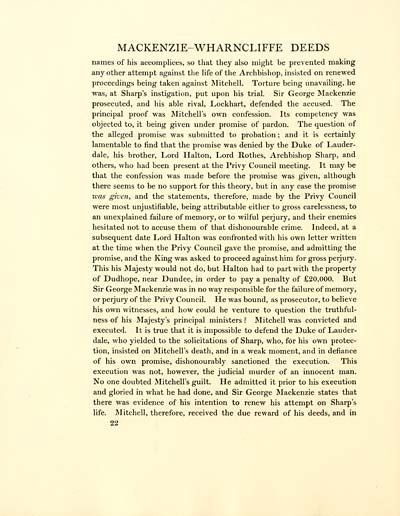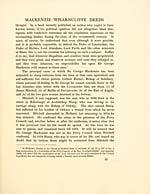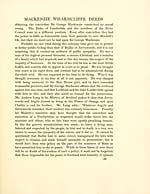Download files
Complete book:
Individual page:
Thumbnail gallery: Grid view | List view

MACKENZIE-WHARNCLIFFE DEEDS
names of his accomplices, so that they also might be prevented making
any other attempt against the life of the Archbishop, insisted on renewed
proceedings being taken against Mitchell. Torture being unavailing, he
was, at Sharp's instigation, put upon his trial. Sir George Mackenzie
prosecuted, and his able rival, Lockhart, defended the accused. The
principal proof was Mitchell's own confession. Its competency was
objected to, it being given under promise of pardon. The question of
the alleged promise was submitted to probation ; and it is certainly
lamentable to find that the promise was denied by the Duke of Lauder-
dale, his brother, Lord Halton, Lord Rothes, Archbishop Sharp, and
others, who had been present at the Privy Council meeting. It may be
that the confession was made before the promise was given, although
there seems to be no support for this theory, but in any case the promise
was given, and the statements, therefore, made by the Privy Council
were most unjustifiable, being attributable either to gross carelessness, to
an unexplained failure of memory, or to wilful perjury, and their enemies
hesitated not to accuse them of that dishonourable crime. Indeed, at a
subsequent date Lord Halton was confronted with his own letter written
at the time when the Privy Council gave the promise, and admitting the
promise, and the King was asked to proceed against him for gross perjury.
This his Majesty would not do, but Halton had to part with the property
of Dudhope, near Dundee, in order to pay a penalty of £20,000. But
Sir George Mackenzie was in no way responsible for the failure of memory,
or perjury of the Privy Council. He was bound, as prosecutor, to believe
his own witnesses, and how could he venture to question the truthful-
ness of his Majesty's principal ministers ? Mitchell was convicted and
executed. It is true that it is impossible to defend the Duke of Lauder-
dale, who yielded to the solicitations of Sharp, who, for his own protec-
tion, insisted on Mitchell's death, and in a weak moment, and in defiance
of his own promise, dishonourably sanctioned the execution. This
execution was not, however, the judicial murder of an innocent man.
No one doubted Mitchell's guilt. He admitted it prior to his execution
and gloried in what he had done, and Sir George Mackenzie states that
there was evidence of his intention to renew his attempt on Sharp's
life. Mitchell, therefore, received the due reward of his deeds, and in
22
names of his accomplices, so that they also might be prevented making
any other attempt against the life of the Archbishop, insisted on renewed
proceedings being taken against Mitchell. Torture being unavailing, he
was, at Sharp's instigation, put upon his trial. Sir George Mackenzie
prosecuted, and his able rival, Lockhart, defended the accused. The
principal proof was Mitchell's own confession. Its competency was
objected to, it being given under promise of pardon. The question of
the alleged promise was submitted to probation ; and it is certainly
lamentable to find that the promise was denied by the Duke of Lauder-
dale, his brother, Lord Halton, Lord Rothes, Archbishop Sharp, and
others, who had been present at the Privy Council meeting. It may be
that the confession was made before the promise was given, although
there seems to be no support for this theory, but in any case the promise
was given, and the statements, therefore, made by the Privy Council
were most unjustifiable, being attributable either to gross carelessness, to
an unexplained failure of memory, or to wilful perjury, and their enemies
hesitated not to accuse them of that dishonourable crime. Indeed, at a
subsequent date Lord Halton was confronted with his own letter written
at the time when the Privy Council gave the promise, and admitting the
promise, and the King was asked to proceed against him for gross perjury.
This his Majesty would not do, but Halton had to part with the property
of Dudhope, near Dundee, in order to pay a penalty of £20,000. But
Sir George Mackenzie was in no way responsible for the failure of memory,
or perjury of the Privy Council. He was bound, as prosecutor, to believe
his own witnesses, and how could he venture to question the truthful-
ness of his Majesty's principal ministers ? Mitchell was convicted and
executed. It is true that it is impossible to defend the Duke of Lauder-
dale, who yielded to the solicitations of Sharp, who, for his own protec-
tion, insisted on Mitchell's death, and in a weak moment, and in defiance
of his own promise, dishonourably sanctioned the execution. This
execution was not, however, the judicial murder of an innocent man.
No one doubted Mitchell's guilt. He admitted it prior to his execution
and gloried in what he had done, and Sir George Mackenzie states that
there was evidence of his intention to renew his attempt on Sharp's
life. Mitchell, therefore, received the due reward of his deeds, and in
22
Set display mode to:
![]() Universal Viewer |
Universal Viewer | ![]() Mirador |
Large image | Transcription
Mirador |
Large image | Transcription
Images and transcriptions on this page, including medium image downloads, may be used under the Creative Commons Attribution 4.0 International Licence unless otherwise stated. ![]()
| Histories of Scottish families > Ancient deeds and other writs in the Mackenzie-Wharncliffe charter-chest > (44) Page 22 |
|---|
| Permanent URL | https://digital.nls.uk/95523893 |
|---|
| Description | A selection of almost 400 printed items relating to the history of Scottish families, mostly dating from the 19th and early 20th centuries. Includes memoirs, genealogies and clan histories, with a few produced by emigrant families. The earliest family history goes back to AD 916. |
|---|

